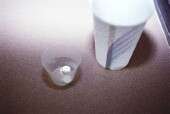Pain reliever lowers blood sugar in type 2 diabetics, study says

(HealthDay)— An aspirin-like drug appears to lower blood sugar in people with type 2 diabetes, according to new research.
A study of the drug—the prescription pain reliever salsalate—also found it reduced inflammation associated with type 2 diabetes. But it produced unwelcome side effects that could limit its potential as a diabetes treatment.
"This trial is a test of possibly the oldest drug in Western use, and, because it's so old, there are no clinical trials on it," said study senior author Dr. Steven Shoelson, a professor of medicine at Harvard Medical School in Boston.
"This trial was for a full year and showed that salsalate does lower blood glucose," said Shoelson, who is also the associate research director at the Joslin Diabetes Center in Boston.
The study, published in the July 2 issue of the Annals of Internal Medicine, included 286 people between 18 and 75 years old with type 2 diabetes. Type 2 diabetes occurs when the body no longer produces enough of the hormone insulin to convert carbohydrates from food into fuel for the body.
At the start of the study, the participants' average A1C levels—a measure of blood sugar levels over several months—were between 7 and 9.5 percent. The American Diabetes Association generally recommends a level of below 7 percent for adults.
The study volunteers were randomly assigned to 48 weeks of salsalate at a dose of 3.5 grams per day, or to an inactive placebo pill. No other changes were made to current diabetes, blood pressure or cholesterol medications during the first six months of the trial, the researchers noted.
Over 48 weeks, people taking the medication saw their A1C levels drop by 0.37 percent compared to placebo.
Shoelson said that people who have metabolic syndrome—a group of risk factors (including type 2 diabetes) for cardiovascular disease—often have higher than normal white blood cell counts, suggesting inflammation. In this study, people on salsalate saw a drop in their white blood cell counts, but Shoelson noted that they were "always well within the normal range."
Improvements were seen in several areas among those taking the drug, including: fasting blood sugar; uric acid, which is a chemical associated with gout; and levels of triglyceride, a type of blood fat. Levels of adiponectin—a substance related to decreased insulin resistance—and hematocrit, a measure of red blood cells, also improved for people taking salsalate.
Not all of the changes linked to the drug were beneficial, however. The medication appeared to cause a slight weight gain—less than 3 pounds compared to those taking the placebo. Many type 2 diabetes medications have weight gain as a side effect, Shoelson said.
Salsalate was also linked to an increase in LDL cholesterol, which is associated with heart disease. "There was a small elevation in LDL cholesterol, and we prefer not to see that, although we can bring it down with [cholesterol-lowering drugs]," he said.
Elevated urinary albumin levels, which can indicate reduced kidney function, were also seen among those taking the drug but albumin levels returned to normal when the drug was stopped, Shoelson said.
No increase in gastrointestinal bleeding was reported in those on salsalate, which had been a concern because the drug is a chemical cousin of aspirin, he added.
At this point, it's premature to recommend the use of salsalate for people with type 2 diabetes, Shoelson said. "I would like to see further clinical trials and studies, and the [U.S. Food and Drug Administration] likes to see information on cardiovascular and long-term risks," he noted.
Dr. Joel Zonszein, director of the clinical diabetes center at Montefiore Medical Center in New York City, said he doubts the FDA will approve salsalate for diabetes treatment. "This medication has a lot of limitations and side effects, and it doesn't cause a significant drop in the A1C," said Zonszein.
Diet and exercise could cause many of the reported changes, such as the increase in adiponectin, he said. If this medication were reducing inflammation, significant changes would be seen in highly sensitive C-reactive protein (CRP), and none were noted here, he added.
"Drugs like Actos or Avandia drop CRP by 20, 30, even 50 percent, and here there wasn't a significant drop," said Zonszein.
Salsalate is marketed under the brand names Salsitab, Mono-Gesic, Salflex and Disalcid.
More information: Learn more about type 2 diabetes medications from the American Diabetes Association.
Health News Copyright © 2013 HealthDay. All rights reserved.

















